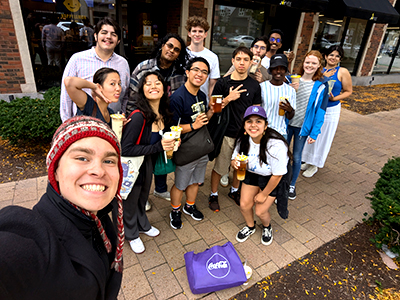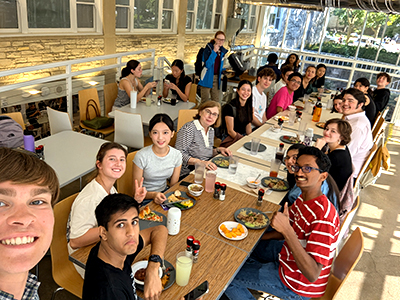Chapin Hall: A home for the humanities
For anybody who wants an opportunity to recreationally do humanities in a community that is small, supportive and diverse, Chapin is where it’s at.”
Meaghan Fritz
Chapin Faculty Chair
Northwestern’s humanities-focused Residential College helps students find friendship, faculty connections and belonging
Cameron Lara, now a second-year Weinberg student, came to Northwestern University in search of a community. When Lara heard about Northwestern’s Residential College system, he thought it would be easier to meet friends through planned events and knew he had to apply.
Lara was assigned to Chapin Hall, a residential community in the Southwest Residential Area that houses approximately 65 students. Now in his second year living in Chapin, Lara is reflecting on his role as outgoing Chapin president.
“I’m really happy that I got placed there because I’ve met some of my best friends now,” Lara said. “We’ll see people throughout the day, and we’ll say hello to each other. It’s just sort of a nice, little, tight-knit community.”
 Chapin is one of Northwestern’s ten Residential Colleges, communities led by faculty and elected student-leaders who plan academic and social events for their residents. Each Residential College has fellows who engage with students outside the classroom over meals, at events and even on excursions to Chicago.
Chapin is one of Northwestern’s ten Residential Colleges, communities led by faculty and elected student-leaders who plan academic and social events for their residents. Each Residential College has fellows who engage with students outside the classroom over meals, at events and even on excursions to Chicago.
Some Residential Colleges are multi-thematic, while others have a single unifying theme. As the humanities Residential College, Chapin hosts programming grounded in the liberal arts. Faculty members frequently host fireside events, presenting on academic topics of their choice. This year, Elzbieta Foeller-Pituch, assistant director of the Nicholas D. Chabraja Center for Historical Studies, led a popular Valentine’s Day gathering featuring a lecture on Jane Austen, followed by a hands-on treat bowl-making activity. In another event, Vivasvan Soni, associate professor of English, took six students to the Chicago Humanities Festival to attend Ocean Vuong’s talk on loss and hope.
Sean Ebels-Duggan, a lecturer in philosophy and associate chair of Chapin, explained that residential colleges are designed to promote an environment of learning and help students interact with faculty and their work in a more personal way than the classroom.
“As a faculty member, it’s really nice to see people who are interested in asking interesting questions and being readily available to discuss them,” Ebels-Duggan said
In her six years at Northwestern, Asst. Prof. of Instruction Meaghan Fritz, Chapin's faculty chair, has found that first- and second-year students are more likely to feel nervous about approaching faculty members.
“Office hours can be so intimidating,” Fritz said. “Having a cadre of faculty that are devoted to you and a select group of students that are around and available is a great way for students to practice approaching professors in a way that’s not as intimidating as the classroom could be.”
In his two years living in Chapin, Lara has enjoyed interacting with faculty members as well as fellow students.
“We know professors are human, but I think being able to interact with them outside the classroom humanizes them in a sense,” Lara said. “It’s super cool to be able to talk to them about stuff other than class—like our weeks and how our classes are going—and get advice sometimes.”

Ebels-Duggan and Fritz both said that Chapin’s small size fosters a cozy and welcoming environment with more opportunities for students and faculty to interact.
Every week, Chapin hosts Munchies, a chance for students to eat, relax and catch up with other students. Chapin also organizes informal activities, such as cinema club, cooking events and a book club hosted by Fritz. Chapin residents, affectionately known as “Chapinos,” also attend events hosted by the other Residential College communities.
Lara, who is also currently on the Residential College board, is a “big proponent” of Northwestern’s Residential Colleges.
“I’ve sort of grown to love this community—not only within Chapin but also across the whole Residential College system. I think it’s a great way to get involved in a way that you don’t have to necessarily put yourself out there as much,” he added.
Each Residential College fosters its own distinct culture—and Fritz said Chapin’s is especially close-knit.
“Chapin feels more like an old house than a huge dorm, so it feels personal,” said Fritz. “For anybody who wants an opportunity to recreationally do humanities in a community that is small, supportive and diverse, Chapin is where it’s at.”
